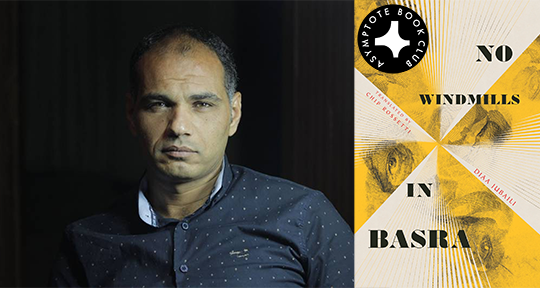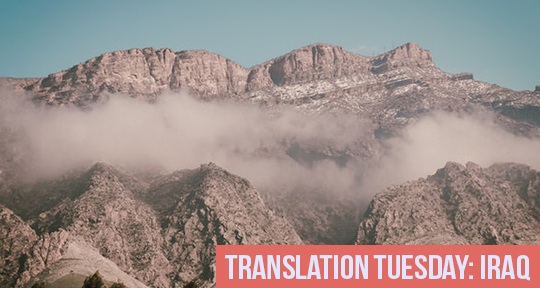In this fantastic, sobering, and imagistic collection, Diaa Jubaili uses the folktale traditions of Iraq to reflect newly on war, country, and national history. Unlike traditional legends, where magic lives in the world as phenomenon and circumstance, the characters of these stories defy their grave realities with feats of imagination, in bold and moving demonstrations of how the mind can transcend matter. In humanizing the struggles of Iraq across its conflicts, Jubaili addresses the horrors of war with philosophical wit and metaphysical possibility.
The Asymptote Book Club aspires to bring the best in translated fiction every month to readers around the world. You can sign up to receive next month’s selection on our website for as little as USD15 per book; once you’re a member, join our Facebook group for exclusive book club discussions and receive invitations to our members-only Zoom interviews with the author or the translator of each title.
No Windmills in Basra by Diaa Jubaili, translated from the Arabic by Chip Rossetti, Deep Vellum, 2022
On the surface, fairy tales should theoretically be easy to translate (if there is a world in which translation is easy); they’re usually simplistically narrated, lexically limited, and short. But of course, texts that seem simple on the surface can often turn out to be immensely difficult, and in the case of fairy tales, perplexing questions arise almost immediately, because so much of what they impart depends on a reader’s pre-existing cultural knowledge. Can any of us remember a time when we didn’t know the story of Little Red Riding Hood?
The challenges of translation are made even more evident when the fairy tales are intended for adults, as is the case with Diaa Jubaili’s stories in No Windmills in Basra, translated from the Arabic by Chip Rossetti. In this collection of tales—some less than a page long, some ranging over several pages—Jubaili engages slantwise with the history of Iraq and Basra over the past seventy years. Rather than writing a collection of realist fiction, the author departs from reality and time to scratch at those seemingly eternal themes so often associated with fairy tales.
In the opening story of the collection, “Flying,” for example, a security guard named Mubarak thinks often of launching airborne as he guards the chickens at a poultry plant south of Basra.
. . . he flew twice—not on a plane, or by means of a hot air balloon or parachute, and not even on a giant demon’s wings or a magic carpet as happened so often in the tales from the Thousand and One Nights. Nor was he an admirer of the medieval scientist-inventor Ibn Firnas, who dreamed of flapping wings and soaring heights, since Mubarak knew that with that sort of thing, he would eventually end up a pile of broken bones on the side of the road.
There is no magic in this story—at least not the kind we associate with fairy tales—but that does not stop Mubarak from experiencing a journey from the everyday to the cosmic. In his first experience with flight, As an infantry soldier whose company is targeted by bombing, he is tossed into the air after a detonation, being sent briefly into a world where a man airborne is not shorthand for a fighter pilot honing in for the kill, but instead a miracle that allows for deferred violence and peace accords. Of course, Mubarak’s flight comes at the expense of his company, all of whom die in the explosion. Fairy tales are fantastic things, but they’re also dangerous things, and miracles usually have exacting prices. In fact, in this story, American munitions are the only means by which Mubarak can again take flight. The djinns and magicians of the Thousand and One Nights have been replaced by the darker realities of modern warfare. READ MORE…




From Silly to Deadly: On Shalash the Iraqi by Shalash
. . .key to the humourist’s arsenal is none other than language itself—its malleability, its capacity for aggrandisement and diminishment alike.
Shalash the Iraqi by Shalash, translated from the Arabic by Luke Leafgren, And Other Stories, 2023
Anonymity fascinates and seduces. Endless speculations have circled invasively around who Elena Ferrante “truly” is; Catherine Lacey’s recent Biography of X reckons with erasing a layered past with a single letter of the alphabet; the first season of Bridgerton, the hit Regency-era romance on Netflix, has its narrative engine propelled by the question of Lady Whistledown’s real identity. These instances from the Global North exemplify the allure of mystery, but they fail to account for the stakes of remaining nameless in a political climate where to unveil oneself might be to threaten one’s own safety.
One might, in a moment of facetiousness, think of the eponymous chronicler of Shalash the Iraqi as the Lady Whistledown of Iraq’s Sadr City (or Thawra City, as it is lovingly christened by Shalash). Both issued frequent dispatches from within the epicentre of social disarray, guaranteeing the pleasure of gossip. More importantly, their pseudonymous veneers facilitated a lurid candour that might not otherwise have been possible.
There the similarities end. The respectable circles of upper-crust London did not live in the penumbra of foreign occupation. Nor were they plagued with the constant risk of spectacular sectarian violence, or hampered by a corrupt government that has “thieves, cheats, swindlers, traders in conspiracies” for politicians. It was against such chaos that Shalash released his explosive, timely blog posts, garnering a rapidly expanding local readership despite patchy Internet access in the country. The academic Kanan Makiya tells us, in his introduction, that people were printing out the posts, “copying them longhand,” “bombarding Shalash with questions and opinions.” Even high-ranking cadres could not resist partaking in the fanfare: one official expressed admiration while entreating Shalash not to mock him, for fear of his children’s potential disappointment. Another claimed that upon reading the daily communiqués, he would fall off his chair laughing.
Laughter, perhaps, can always be counted on to forge an affinity, if not a unity, beyond fractures of sect, status, and ethnic affiliation. Iraqis would “drop everything for a good laugh”; they gather in bars and down glasses of arak to immerse themselves in a “great, communal, and nondenominational drunkenness.” Shalash knows this, and abundantly turns it to his advantage. Nothing and no one is spared from the crosshairs of his ridicule, populated by a variegated cast that encompasses sermonisers, soldiers, suicide bombers, and donkeys. A vice-president’s verbal pomposity sounds like “he just ate a few expensive dictionaries and is about to lose his lunch.” A woman about to be married off to an Australian cousin is told, should her fiancé divorce her, “just tell everyone that he’s a terrorist and you’ll have nothing to worry about.” An odious neighbour, eager to save a spot for himself in paradise, proselytises the necessity of voting in the referendum for Iraq’s new constitution: “Don’t you know the going rate for rewards in heaven for helping ratify the constitution? It’s worth a hundred visits to the shrine of the Eighth Imam, and that’s on the far side of Iran!” When the narrator casually uses Google Earth, he is accused of lecherously spying on the women of his residence, sparking off a widespread hysteria—and court case—about the “violation of the morals of the block.” Each instance of mockery is a shard in a wider mirror of collective trauma.
READ MORE…
Contributor:- Alex Tan
; Language: - Arabic
; Place: - Iraq
; Writers: - Abu al-Qasim
, - Ahmed Saadawi
, - Catherine Lacey
, - Elena Ferrante
, - Emily Dickinson
, - Hassan Blasim
, - Kanan Makiya
, - Maya Abu al-Hayyat
, - Shalash
; Tags: - American occupation
, - anonymity
, - arabic literature
, - blogging
, - humor
, - Iraqi literature
, - social commentary
, - US Invasion of Iraq